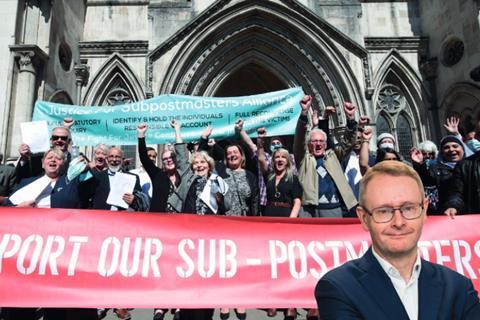Amid mounting public outrage over the Post Office scandal, Legal Services Board chief Matthew Hill has delivered an outspoken valedictory message on the current state of legal regulation

Matthew Hill (pictured, inset), chief executive of the Legal Services Board, proved to be an unlikely star turn at last Friday’s seminar on professional ethics hosted by the Westminster Legal Policy Forum. There were no bromides or smooth circumlocutions from this civil servant, at an event which inevitably focused on three high-profile manifestations of alleged lawyer wrongdoing. They were the Post Office Horizon scandal, strategic litigation against public participation (SLAPPs) and non-disclosure agreements (NDAs).
To the evident surprise of other delegates (and, who knows, perhaps because he is leaving the LSB next month for the Chartered Insurance Institute), Hill did not pull his punches.
‘It’s customary at a talk like this for people like me to issue a disclaimer in order not to hurt feelings or give offence,’ the boss of the profession’s umbrella regulator began. ‘To say that the vast majority of lawyers behave ethically all the time.
‘I’ve stopped saying this, because I don’t think anyone can actually demonstrate that it’s true. It has become a sort of article of faith that has no real place in a rational debate about the future of legal ethics. There are two statements in this debate that are almost certainly false. The first is that all these problems are down to a few “bad apples”. [The second] is that all lawyers are crooks.
‘In between those two statements lies a very complicated landscape, and one about which we probably need to be more honest with ourselves if we’re to drive the sorts of improvements in standards that the public deserve.’
'It seems to me that public concern is now so widespread that continued lack of energy from the regulators, and indeed professionals more broadly, to grapple meaningfully with these issues is starting to look quite stark. One might say mildly ridiculous'
Matthew Hill, LSB
Hill’s own refreshing candour must have been disconcerting for the regulators in attendance. These included Juliet Oliver, deputy chief executive, general counsel, and executive director (investigations and enforcement) at the Solicitors Regulation Authority.
Has the SRA been getting it wrong all this time? Has the LSB been getting it wrong? It did not seem unreasonable to infer as much, as Hill went on to outline three related points that he considered would be ‘helpful for legal regulators, and indeed leaders in the sector more broadly’, to focus on.
‘The first is an acceptance that there is likely to be a strategic failing with current approaches to regulation,’ said Hill. ‘So, while we’ve seen some welcome moves by regulators to reflect issues of public concern – for example, the warning notices issued by the SRA on SLAPPs and NDAs – the response has been slower and less extensive than I think any reasonable observer would now consider justified.’
Hill has ‘some sympathy’ with the watchdogs, which ‘frequently face stiff and concerted opposition’ to their more ‘profound’ edicts. But he continued: ‘It seems to me that public concern is now so widespread that continued lack of energy from the regulators, and indeed professionals more broadly, to grapple meaningfully with these issues is starting to look quite stark. One might say mildly ridiculous.
‘For clarity, I’m not talking about stepping up individual prosecutions of individual lawyers. There will be a time for that. What I am talking about is the question of how are the things that we are discussing today happening despite our system of regulation?’
In what sounded like a parting shot, Hill called on the frontline regulators to turn good intentions into achievements. He added: ‘You can have all the guidance, warning notices, codes of conduct you like, but if you can’t turn that into real visible results, so that people who have suffered harm can see that there are consequences for wrongdoing, it’s all a bit pointless. So if you publish a warning notice on SLAPPs, for example, or NDAs, and then dismiss all the complaints that are brought under those notices, pretty soon people are going to lose faith and confidence. And if that happens, it would likely be, or should be, a matter of grave concern to everybody in this conversation today.
‘The final point I’ll make is that I think there is cause for scepticism about [whether] the hundreds, even thousands, of rules that make up the various regulatory processes are actually capable of driving the positive behaviours and values that the public has the right to expect from legal professionals. I know it’s a slightly provocative thing to say, but I do find myself wondering whether it might be possible to be in apparent full technical compliance with, say, the BSB [Bar Standards Board] or SRA handbooks and codes of conduct, and still be a pretty bad barrister or solicitor.
‘It may be that there’s been too much focus on individual transgressions by individual lawyers, and not enough focus on identifying societal risks, issues of leadership, culture, ethos, and values.’
Hill wants to see legal services regulation becoming ‘much more productive and actively shaping the sector by focusing robustly on how it is led’.
The LSB chief did at least sign off with a few emollient words: ‘In the LSB, we’ve been building a programme of regulatory change in relation to legal ethics and the rule of law since 2021. And during that time, we’ve seen a growing prominence of ethical and rule-of-law issues on the agenda. Today’s conference and the breadth of contributions, is good empirical evidence of that. But I think it really is time to drop the defences, roll up the sleeves and tackle the issues head on.’
'The move away from detailed prescriptive rules has served us well in building in a degree of flexibility which allows us to meet the changing needs of the sector and to respond to new issues when they emerge. Prescription risks being out of date as soon as it’s written'
Juliet Oliver, SRA
Hill’s principal contention – frontline regulators can’t see the wood for the trees anymore because their view is obscured by a dense thicket of prescription – prompted an implied rebuttal from the SRA’s Oliver. ‘It’s worth flagging that in 2019 we moved to a shorter, simpler principles-based code of conduct,’ she said. ‘That code places emphasis on obligations which promote and protect the public interest, acting with honesty, integrity, independence. Where there’s a conflict, these obligations prevail over the principle to act in the best interest of your client.
‘The move away from detailed prescriptive rules has served us well in building in a degree of flexibility which allows us to meet the changing needs of the sector and to respond to new issues when they emerge. Prescription risks being out of date as soon as it’s written. Our previous code was very detailed on some things but silent on others. It is critical for us to ensure we understand the changing environment and that the profession is aware of, and equipped to deal with, the challenges it is facing.’
Hill’s barb about regulators ‘lacking energy’ comes in the context of fierce criticism of the SRA for not acting more quickly to arraign solicitors implicated in the Post Office scandal. On that score at least, the regulator got a pass from Exeter University’s Professor Richard Moorhead, commentator on (and assiduous chronicler of) the Horizon debacle and the lawyers involved in it.
Moorhead told the event he is ‘cautiously supportive’ of the SRA’s stance of awaiting the outcome of the public inquiry – ‘or certainly the evidence-gathering phase of the inquiry’ – before mounting prosecutions. But he added: ‘I think they [the SRA] could have been much clearer, vociferous and purposeful in their communications about what they are doing and the kinds of things they are looking at, to convince the profession and the public, and the victims of the scandal, that they are taking it seriously.’
Moorhead considers it ‘highly likely’ that solicitors, some ‘quite senior’, will end up being struck off over their part in the scandal. He also expects ‘one or two’ to face criminal prosecution.
Another challenge for the SRA is ‘how are they going to move from business as usual, to making ethics a priority’, he added. ‘That decisions ranging between the merely questionable and the clearly outrageous should be sprinkled across so many years, within and outside the Post Office, in-house and private practice, across the bar and the solicitors profession, junior and very, very senior, suggests professional ethics is something which practitioners are insufficiently interested in or [are] complacent about,’ said Moorhead.
Oliver pointed out that in January, the SRA published an update on its Post Office investigation. This noted that the regulator is investigating a number of live cases involving solicitors and law firms who were working on behalf of the Post Office/Royal Mail Group. But she said the SRA would ‘take on board’ Moorhead’s comments about ‘the level of detail that it might be helpful to go into in terms of transparency around what we are doing’.
This article is now closed for comment.




































12 Readers' comments